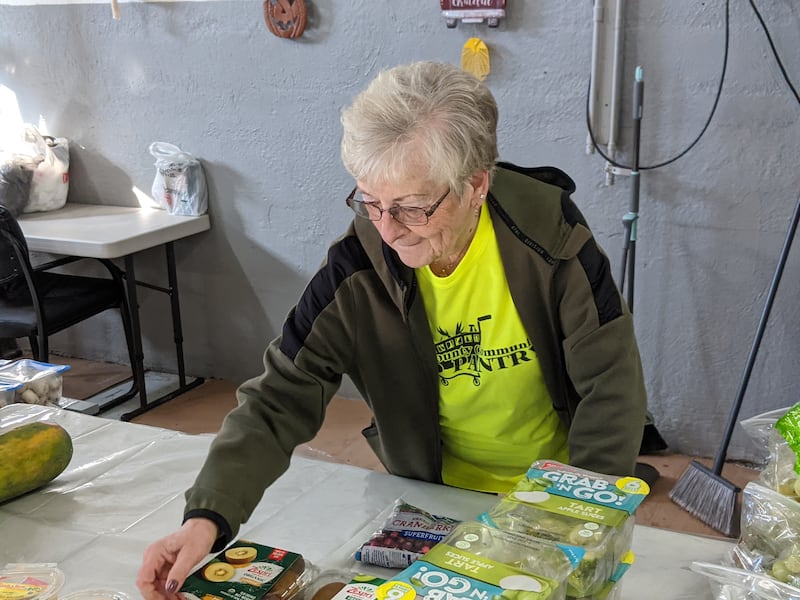With federal food assistance funds lagging because of the continuing government shutdown, Kendall County Community Food Pantry has recently been experiencing an uptick in customers.
Two federal judges ruled nearly simultaneously on Friday that President Donald Trump’s administration must continue to fund SNAP, the nation’s biggest food aid program, using contingency funds during the government shutdown, the Associated Press reported
The rulings came a day before the U.S. Department of Agriculture planned to freeze payments to the program because it said it could no longer keep funding it due to the shutdown, the Associated Press reported.
It is not clear when the debit cards that beneficiaries use to buy groceries could be reloaded after Friday’s ruling. That process often takes one to two weeks, according to the Associated Press.
On Oct. 10, the U.S. Department of Agriculture sent a letter to state SNAP agencies announcing that if the federal government shutdown continued, there would be insufficient funds to pay full November benefits for the about 42 million people across the country – including about 2 million in Illinois - that rely on them.
The USDA sent another letter to state agencies on Oct. 24.stating SNAP benefits would be suspended Nov. 1.
Illinois Attorney General Kwame Raoul’s Office joined a coalition of 26 attorneys general and governors in filing a lawsuit against the USDA and its Secretary Brooke Rollins for unlawfully suspending SNAP, according to Raoul’s office.
In the interim, Gov. JB Pritzker signed an executive order on Thursday directing $20 million in funding to be directed towards aiding the state’s food banks “to mitigate the harmful policies and actions taken by the Trump Administration.”
Northern Illinois Food Bank will receive $2.3 million.
All of the legal maneuvering aside, the funding freeze still leaves Illinois and Kendall County residents in limbo and local organizations scrambling to find ways to make sure food is getting on people’s tables.
“That gap needs to be filled somehow,” Kendall County Community Food Pantry Executive Director Alex Hurd said. “Monday, Tuesday and Wednesday have been really busy in terms of phone calls and people just inquiring about how they sign up and what that entails. I think what’s happening is that uncertainty breeds concern and fear, and rightfully so. So I think people are just very, very nervous right now and so there just is greater interest in what our services are.”
The Kendall County Community Food Pantry, 208 Beaver St., Yorkville, serves not only Kendall County, but also DeKalb and La Salle counties. The pantry’s main facility is located at 208 Beaver St. in Yorkville.
The pantry also operates two satellite facilities, one at the former Traughber Junior High School building at 61 Franklin St. in Oswego and another one at First Lutheran Church of Plano, 200 N. Center St., Plano.
The number of customers the pantry sees fluctuates.
“Two weeks ago, we saw 466 customers and then last week, I think we did 422,” Hurd said. “But I would not be surprised if it starts trending toward that higher number, getting back to towards 450 or 460. If this week is any indication, based on how many phone calls and how many people have walked in to fill out an application, we’re going to be more and more busy.”
With the expected increase in demand, Hurd said that financial donations “at this point are going to be more important than ever.”
The food pantry not only offers food assistance, it also offers pet food and supplies along with clothing and small household items.
:quality(70)/cloudfront-us-east-1.images.arcpublishing.com/shawmedia/FHSH7RIVZ5DZPGEKFNI276ONAQ.jpg)
The Northern Illinois Food Bank works with more than 900 food pantries, soup kitchens, shelters and other feeding programs to distribute food across 13 counties.
“We work really closely with them,” said Jen Lamplough, chief impact officer at Northern Illinois Food Bank. “And we’re working on forecasting what the demand might be, most urgently in November.”
Food pantries across northern Illinois have already been anticipating an increase in demand as a result of almost $200 billion in cuts in the next 10 years to the SNAP program.
The cuts are part of the One Big Beautiful Bill Act that President Donald Trump signed into law July 4. The bill changes eligibility requirements, putting an estimated 360,000 Illinoisans at risk of losing SNAP benefits.
Along with the change in eligibility requirements, Illinois and other states will have to cover a greater portion of costs for the SNAP program.
As part of the new rules, able-bodied adults ages 55 to 64 without dependent children and parents of children 14 and older will have to work at least 20 hours a week or participate in training programs. Before, this applied only to people up to age 54.
“We’re working on getting more food donated and purchased so that we can do the best we can to meet the need,” Lamplough said. “For every one meal that our network can provide, SNAP provides nine meals. So we’re talking almost half a million in Northern Illinois who have SNAP that are potentially going to lose it in November and potentially in the longer term.”
Government support for the Northern Illinois Food Bank for fiscal 2026 is decreasing by 40%, about $3 million to $4 million, or about 10% of the food bank’s budget. To help make up for that loss, the food bank launched a Community Response Fund.
With the holidays coming up, the cuts and government shutdown come at the worst time for families that rely on the benefits.
“With kids being home from school for holiday breaks, it’s harder on the families when the kids can’t get school meals,” Lamplough said.
She also noted that the Low-Income Home Energy Assistance Program is also being affected by the government shutdown.
“It’s one hit after another for our most vulnerable,” Lamplough said.

:quality(70)/author-service-images-prod-us-east-1.publishing.aws.arc.pub/shawmedia/4874e1d5-91ae-4f41-9dee-92d8e733e407.jpg)